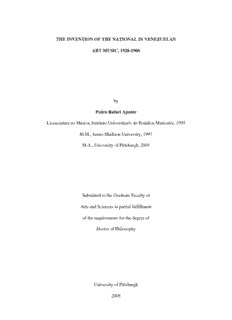
THE INVENTION OF THE NATIONAL IN VENEZUELAN ART MUSIC, 1920-1960 by Pedro Rafael ... PDF
Preview THE INVENTION OF THE NATIONAL IN VENEZUELAN ART MUSIC, 1920-1960 by Pedro Rafael ...
THE INVENTION OF THE NATIONAL IN VENEZUELAN ART MUSIC, 1920-1960 by Pedro Rafael Aponte Licenciatura en Música, Instituto Universitario de Estudios Musicales, 1995 M.M., James Madison University, 1997 M.A., University of Pittsburgh, 2004 Submitted to the Graduate Faculty of Arts and Sciences in partial fulfillment of the requirements for the degree of Doctor of Philosophy University of Pittsburgh 2008 UNIVERSITY OF PITTSBURGH SCHOOL OF MUSIC This dissertation was presented by Pedro Rafael Aponte It was defended on October 27, 2008 and approved by Dr. Deane Root, Professor of Music Dr. Don Franklin, Professor of Music Dr. Mary Lewis, Professor of Music Dr. Joshua Lund, Associate Professor of Hispanic Languages and Literature Dissertation Advisor: Dr. Deane Root, Professor of Music ii Copyright © by Pedro Rafael Aponte 2008 iii THE INVENTION OF THE NATIONAL IN VENEZUELAN ART MUSIC, 1920-1960 Pedro Rafael Aponte, Doctor of Philosophy University of Pittsburgh, 2008 This dissertation explores the developments of art music in Venezuela during the first half of the twentieth century as an exercise in nation building. It argues that beginning in the early 1920s a nationalist movement in music emerged, which was not only determined by but also determinant in the construction of a concept of nationhood. The movement took place at a crucial time when the country had entered a process of economic transformation. The shift in Venezuela’s economic system from agrarian to industrial in the 1910s triggered a reconfiguration of the country’s social and cultural structures. Industrialization brought about a new type of culture in which individual loyalties to the nation became more apparent than ever before. The institutionalization of national culture took place not only within the government, through state policies of national integration, but also less formally within social organizations. At both levels, however, the process of institutionalizing national culture involved a great deal of cultural engineering and invention. In art music, these dynamics took the form of a nationalist movement initiated by a group of native musicians in the city of Caracas around 1920. These musicians sought to modernize musical life in the country, which they saw as being old-fashioned in comparison to contemporary European music. In addition to creating a modern music infrastructure they sought to establish a national art-music culture. To that end, they set out to articulate a national ideology of music and to act on several nationalistic objectives: revising the narrative of the country’s iv music history, disseminating historical and ethnomusicological research, creating national policies on music and music education, and composing a nationalist musical repertoire. By looking at those musical developments against the backdrop of social change, this dissertation seeks to illuminate the constructionist nature of musical nationalism in mid- twentieth-century Venezuela. In this light, the renovation movement is to be seen as a nation- building project made possible by constructing and solidifying new modes of cultural communication and new identifying marks of national culture. v TABLE OF CONTENTS ACKNOWLEDGMENTS .......................................................................................................... XI 1.0 INTRODUCTION ........................................................................................................ 1 1.1 MUSICAL NATIONALISM IN VENEZUELA ............................................... 4 1.2 VENEZUELAN NATIONALISM ................................................................... 12 1.3 THE MODERNIST PARADIGM .................................................................... 15 2.0 THE INVENTION OF TRADITION DURING THE FIRST HALF OF THE TWENTIETH CENTURY ......................................................................................................... 20 2.1 VENEZUELAN MODERNITY ....................................................................... 23 2.2 INDUSTRIALIZATION ................................................................................... 26 2.3 NATIONAL UNIFICATION ........................................................................... 30 2.4 POLITICAL INVENTED TRADITIONS ...................................................... 34 2.5 SOCIAL INVENTED TRADITIONS.............................................................. 39 2.5.1 The Nationalist Narrative in Literature ...................................................... 41 2.5.2 Nationalist Art................................................................................................ 45 2.5.3 Sports .............................................................................................................. 48 2.5.4 Radio ............................................................................................................... 57 3.0 THE RENOVATION OF ART MUSIC .................................................................. 61 3.1 THE ARCHITECTS ......................................................................................... 62 vi 3.1.1 Vicente Emilio Sojo ....................................................................................... 63 3.1.2 Juan Bautista Plaza ....................................................................................... 66 3.1.3 José Antonio Calcaño .................................................................................... 70 3.2 MUSICAL RENOVATION .............................................................................. 73 3.2.1 Motivation for Renovation ............................................................................ 75 3.2.2 Renovation of Church-Music Practices ....................................................... 78 3.2.3 Renovation of Music Composition ............................................................... 84 3.3 MUSICAL INFRASTRUCTURE .................................................................... 89 3.3.1 The Unión Filarmónica de Caracas ............................................................. 90 3.3.2 Orquesta Sinfónica Venezuela ...................................................................... 93 3.3.3 The Orfeón Lamas ......................................................................................... 98 3.4 THE DEVELOPMENT OF A PUBLIC AUDIENCE .................................. 103 4.0 THE INVENTION OF THE NATIONALIST IDEOLOGY ............................... 110 4.1 THE EXALTATION OF COLONIAL MUSIC ........................................... 112 4.2 CRITIQUE OF ROMANTICISM ................................................................. 124 4.3 DEFINING VENEZUELAN MUSIC ............................................................ 133 4.3.1 The Invention of the Musical Past ............................................................. 136 4.3.2 The Invention of the National Folklore ..................................................... 137 4.3.3 The Invention of a National Public Culture .............................................. 141 4.3.4 Plaza’s Music Appreciation Radio Programs ........................................... 142 4.3.5 The Music Education Reforms ................................................................... 146 5.0 THE INVENTION OF NATIONAL MUSIC ........................................................ 155 5.1 ANXIETY TO CREATE NATIONALIST MUSIC ..................................... 156 vii 5.2 JOROPO AND THE NATIONAL .................................................................. 166 5.3 THE NATIONALIST SCHOOL OF COMPOSITION ............................... 178 5.4 THE CONSOLIDATION OF THE NATIONALIST STYLE .................... 185 6.0 CONCLUSIONS ...................................................................................................... 207 BIBLIOGRAPHY ..................................................................................................................... 213 viii LIST OF TABLES Table 1. Graduates of Sojo’s Composition Class, 1944-1950 .................................................... 181 Table 2. Orchestral Repertoire by Sojo’s Students, 1940s-1950s ............................................. 188 ix LIST OF FIGURES Figure 1. Vicente Emilio Sojo, Meditación (mm.1-8) .................................................................. 86 Figure 2. Vicente Emilio Sojo, “Kyrie” from Misa cromática (mm. 1-7) ................................... 88 Figure 3. Orquesta Sinfónica Venezuela ...................................................................................... 95 Figure 4. Common rhythmic patterns in joropo music .............................................................. 167 Figure 5. Juan Bautista Plaza, Fuga criolla (first page) ............................................................. 170 Figure 6. Juan Bautista Plaza, Sonatina venezolana (first page) ................................................ 175 Figure 7. Antonio Estévez’s Cantata criolla (“La Porfía” mm. 107-112) ................................ 190 Figure 8. Evencio Castellanos, Santa Cruz de Pacairigua (mm. 29-33) .................................... 191 Figure 9. Gonzalo Castellano, Suite caraqueña (Mov. 1 “Mañana de Domingo” mm.1-3) ...... 192 Figure 10. Folksong “Margarita es una lágrima” ....................................................................... 195 Figure 11. Antelación e imitación fugaz (“Allegro deciso” rehearsal no. 10) ............................ 198 Figure 12. Cantata criolla (“La Porfía” mm. 231-235) .............................................................. 201 Figure 13. Cantata criolla (“La Porfía” mm. 1-6) Dies Irae theme. .......................................... 202 x
Description: